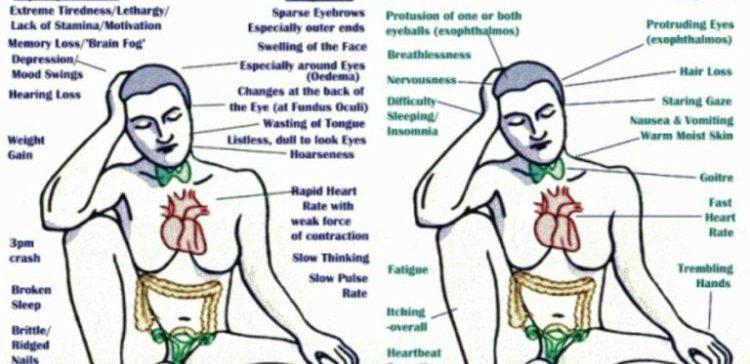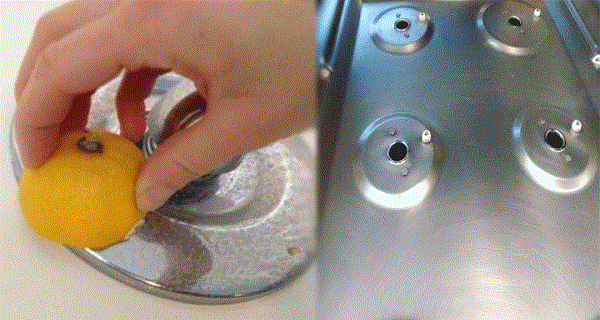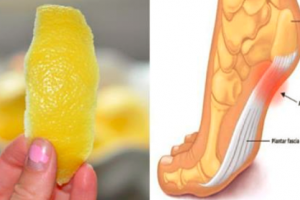Your thyroid gland is a critical part of the endocrine system that is responsible for processes that regulate body temperature, metabolism, and growth. It produces three hormones: T3, T4, and calcitonin, and impacts your entire system.
Calcitonin regulates calcium in the blood, but it’s still being studied for its impact on humans. T3 and T4 are considered the main thyroid hormones. Both contain iodine and need it for their proper function.
When these hormones are produced and released into the bloodstream, they reach the body’s cells to do their job properly. This impacts your whole body, including digestion, organs, joints, and muscles.
The pituitary and hypothalamus help to keep T3 and T4 balanced. When the hormones are out of wack, that’s when problems arise. Thyroid issues can affect anyone at any age, including babies. In the U.S., it’s estimated that at least 20 million have thyroid problems. Worldwide, the estimate is around 200 million.
Below is a list of common thyroid disorders, their symptoms, and common treatments. It is best to follow up with a health professional if you suspect you have one of these conditions.
Common Thyroid Conditions You Need to Know
1- Hyperthyroidism
Occurs when the thyroid gland is overactive in producing hormones. Symptoms include: rapid heartbeat, bulging eyes, sweating, hand tremors, fatigue, anxiety, increased metabolism, shortness of breath, weight loss, light menstruation, and sensitivity to heat.
Treatment includes medication, nutrition, dietary changes like eliminating allergens and refined white flour products, or alternative therapies that include supplements or herbs.
2- Graves’ Disease
Graves’ disease is an autoimmune disorder that is the most common form of hyperthyroidism. With Graves’, the body’s immune system attacks the thyroid and forces it to become overactive. It typically affects people under age 40 and women develop it more often than men.
Symptoms are the same as hyperthyroidism, but also look out for hyperactivity, nervousness, frequent bowel movements, frequent urination (including bed-wetting), poor memory, and poor weight gain. Eye and vision problems like inflammation, pain, and light sensitivity are also symptoms.. In children and teens with Graves’, growth and mood can also be affected.
Medication is used to treat Graves’ to halt the overproduction of thyroid hormones. In more serious cases, surgery may be necessary. Alternative treatments include stress management, eating a diet full of anti-inflammatory foods, and exercise.
3- Hypothyroidism
This is a result of the thyroid being underactive and not producing enough hormones. Symptoms of hypothyroidism include: slow pulse, low body temp, hair loss, fatigue, sensitivity to cold, weight gain, anemia, brain fog, puffy face, constipation, hoarse voice, muscle cramps, thinning eyebrow edges, tingling hands, and heavy periods. In children, delayed growth can occur.
Hypothyroidism can be caused by low levels of iodine in the body, viral infections, or Hashimoto’s thyroiditis. The thyroid can also enlarge and turn into goiter. Conventional treatments include medication, iodine supplementation (food or otherwise), or surgery. Alternative therapies can include eliminating trigger foods (gluten, soy) and stress reduction.
Doctors sometimes recommend cutting down on goitrogenic veggies like kale, broccoli, cauliflower, cabbage and Brussels sprouts, as they can impede thyroid function.
4- Thyroiditis
Thyroiditis is inflammation (swelling) of the thyroid and can be caused by a number of conditions. It may or may not be painful, and typically goes through 3 phases – overactive, underactive, then normal. Hashimoto’s thyroiditis is the most common, and is an autoimmune disorder whereby the anti-thyroid antibodies attack the gland.
Post-partum thyroiditis operates similar to Hashimoto’s where antibodies attack the thyroid shortly after a woman gives birth. Thyroiditis can also be the result of a virus, radiation treatments for hyperthyroidism that reduce hormone production, or medication use.
Some forms of thyroiditis like post-partum may not require treatment. Other forms require prescriptions to regulate thyroid function or to fight pain and infection. It can be treated with alternative therapies that include nutrition (foods and fats that fight inflammation) or supplements.
Continue to the Next Page …









